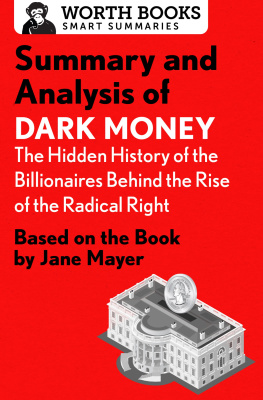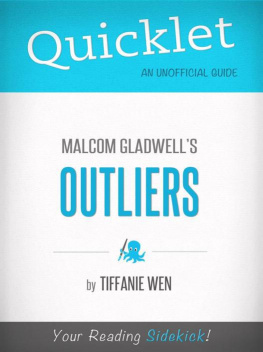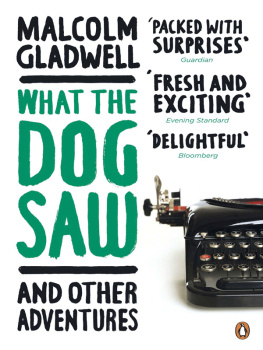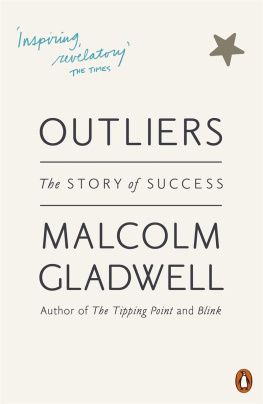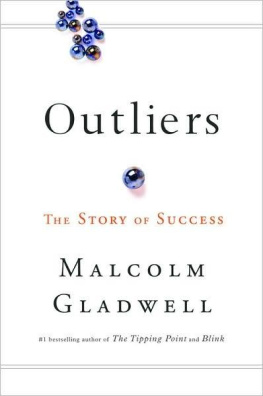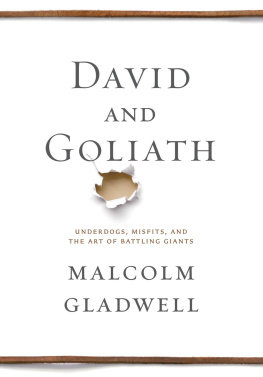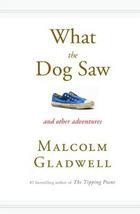Summary and Analysis of
Outliers
The Story of Success
Based on the Book by Malcolm Gladwell

Contents
Context
Outliers originally published in 2008speaks to a culture that regards success largely as a product of individual exceptionalism. It was written at a time when the growth of the tech industry saw the meteoric rise of young moguls such as Mark Zuckerberg, who took Facebook from a dorm-room lark to a multibillion-dollar businessand transformative societal forceseemingly overnight. The popular perception of Zuckerberg and others as visionary prodigies who found fortune and fame through sheer ingenuity is the sort of oversimplified origin narrative that Malcolm Gladwell is seeking to debunk with his alternative perspective on outliers.
As Gladwell said in a 2011 interview with Jeff Glor, Outliers was really inspired by the boomand bustof the past few years. CEOs and bankers and sports stars were all justifying their enormous paydays by arguing that they were responsible, entirely, for their own success I wondered if that was really true.
In our current age of ever-increasing polarization of wealth and fetishization of fame, the lessons of Outliers may prove very instructive. The idea that there is no such thing as a purely self-created success story may help us to think of ways to increase opportunities for the many and not just the few.
Overview
The secret of success is something many of us spend our lives seeking. But what if weve been looking in the wrong places all along? We often assume that those who are successful beyond our wildest dreamsthink of Bill Gates or the members of the Beatlesmust possess some preternatural genius that unequivocally sets them apart from average folks. But Malcolm Gladwell makes a compelling argument in Outliers that, while exceptional ability is certainly a factor in success, its not the defining one.
Instead, he arguesciting a series of fascinating statistics and entertaining anecdotesthat success is largely a product of a combination of fortuitous opportunities, diligent work, and the circumstances in which we are born, brought up, and nurtured. After all, what use is talent if it isnt cultivated and put into practice? What use is a high IQ if you are born in a time and place where there are no opportunities to apply your intelligence in a way that affects others, at scale?
Summary
Introduction: The Roseto Mystery
The insular town of Roseto, Pennsylvania,populated by descendants of Italian immigrants from Roseto Valfortore, Italy, is acurious medical anomaly: As early as the 1950s, the rate of heart disease and otherailments there was shockingly lower than the rest of the United States. Societalills such as substance abuse and crime were also strikingly scarce. So what setRoseto apart? As physician Stewart Wolf discovered, the obvious potential causesahealthy lifestyle, diet, genetics, and so forthdidnt seem to be in play. Instead,he concluded that the distinctive sense of community in the self-contained townforinstance, neighbors greeting one another, multiple generations of a family sharing ahome, an overall egalitarian ethoshad a positive effect on the populationshealth and quality of life. Gladwell frames this surprising, paradigm-shiftinglesson about health as an analogy for the argument Outliers will make about success.
Need to Know
Health may not be entirely about an individuals constitution or life choicesit has a lot to do with the cultural context in which a person lives. And that same principle may apply to personal success.
Chapter One: The Matthew Effect
Were accustomed to thinking of success asthe result of some special, almost magical talent that allows individuals to shineand overcome any obstacles in their path, no matter what advantages they have orhavent been given. (Think of the classic pulled himself up by his bootstrapsnarrative.) But Gladwell is making the case that we are affected by the circumstanceswere born into and the happy (or unhappy) situations we encounter in our lives.
To wit: An astounding number of Canadas elite junior hockey players were born in January, followed by February and March. This phenomenon can be explained by the fact that the age cutoff for youth hockey is January 1so boys born in January could be playing with kids almost a year younger, which almost guarantees that the older players will stand out as having better ability. As coaches winnow down their teams to their perceived all-stars, these older boys are more likely to be selected for the elite squads and hence to receive an advanced level of training and increased practice opportunities that help them develop their abilities andliterallyskate to success. (This phenomenon is also observed in other age-eligibility-limited sports, such as soccer.)
Need to Know
The Matthew effectso called for the Biblical verse Matthew 25:29, which says that those with advantages will be given more, while those without will have theirs taken awayis a kind of snowball effect. An arbitrary advantage (such as ones date of birth relative to competitors) may well be rewarded with further opportunities, which reinforce the perception of superior ability and lead to ever more opportunities and so the achievement gap just keeps widening.
Chapter Two: The 10,000-Hour Rule
What does it take to turn talent and drive into success? We might think the answer lies in some ineffable quality or stroke of fate. Turns out, it can be quantified: by at least 10,000 hours spent practicing and honing ones gifts. And often, getting the chance to log those 10,000 hours of focused effort hinges on being in the right place at the right time.
Some striking examples: Bill Joy, cofounder of Sun Microsystems and widely considered to be a groundbreaker in modern computing, had the good fortune to attend the University of Michigan, where a then practically one-of-a-kind computer center became his second home. Mozart is often cited as a prodigy for composing concertos starting at age 6but his work didnt reach masterpiece level until he was 21. By the time of their American Invasion, the Beatles had honed their talents performing hundreds of marathon gigs in Hamburg, Germany, sometimes clocking eight hours at a stretch.
And finally, one of the ultimate outliers, Microsoft cofounder Bill Gates, had the stunning good luck to start seventh grade at a private school with a computer club funded by students parentsa resource that the vast majority of college students didnt have at the time. Gates was one of a generation of tech pioneers born in or around 1955, a demographic sweet spot for nerds due to the transformational innovations in technology that were taking place as they came of age.
Need to Know
Malcolm Gladwell isnt denying that innate talent plays a part insuccesswho would argue that Mozart, the Beatles, or Bill Gates werent gifted withanything more than practice time? But he does note that 10,000 hours is a fairlyreliable benchmark for how long it takes a person to master their craft, if one iscapable of and driven toward that level of masteryand if that person has otherfactors (culture, technology, etc.) working in their favor.
Chapter Three: The Trouble with Geniuses, Part 1
Does a superior intellect always pan out intosuperior achievement? Wed like to think that true genius always shines through,like a diamond in the rough. But evidence suggests that transcendental brainpowercant necessarily overcome the obstacles one is born facingand in a bigger pictureof success, pure intelligence is just one piece of the puzzle.
Chris Langan, described by Gladwell as the public face of genius in American life, a celebrity outlier, has an IQ that is literally off the chartstoo high to be accurately measured by standard testingbut never achieved true outlier status. Gladwell argues, citing psychologist Liam Hudson, that theres a certain upper threshold beyond which additional IQ points dont count for much in terms of predicting achievement, such as the Nobel Prize. (Consider the analogy of basketballheight matters up to a point, but doesnt necessarily correlate with skill once youre looking at the difference between, say, six foot eight and six foot six.)
Next page



